
-
Romance flows in Jeju. Blue waves crash and break into brilliant white on the beach, while the Jungsangan region hosts a green celebration of nature with its lush forests. From parasitic cones that unfold like gentle petals blooming out of the earth to waterfalls that descend majestically from the sky, no matter where you go in Jeju, you can feel the beauty of nature touch your heart.
-
Jeju is an island shaped by volcanoes, stretching 41km from south to north and 73km from east to west. Its volcanic nature can be found in the nearly 370 parasitic cones that dot the island, lava tubes, spring water (yongcheonsu) rising from between the rocks or strata, and the Gotjawal, woods where trees and rocks blend together. The scenery is unique and unforgettable, making it one of the top travel destinations not only in Korea but also globally. According to data released by Statistics Korea, 15.28 million tourists visited Jeju in 2019 before the COVID-19 outbreak, of which 1.72 million were international visitors. The main attraction of Jeju that attracts so many people is, of course, nature. Whether you're climbing Hallasan Mountain, touring the parasitic cones, or swimming in the ocean, you are always surrounded by dazzling views. Jeju has been recognized for its outstanding beauty with three UNESCO recognitions, starting with its designation as a Biosphere Reserve in 2002, Korea's first World Natural Heritage Site in 2007, and as a World Geopark in 2010.
-
But nature is not the end of Jeju. It’s a paradise for active travelers, with plenty of things to do, like surfing, snorkeling, and horseback riding. Trend-leading and chic cafés and select shops add to the joy of traveling. Restaurants serving dishes made with black pork, cutlass fish, and other foodstuff nurtured by the island deliver amazing flavors. Thus, your trip to Jeju satisfies your five senses.

Historical records say that the people of Jeju paid tributes of tangerines to the king of Baekje in the year 476. This shows that the art of tangerine-growing has been an old and esteemed one that continues to today’s tangerine orchards that dot the island. Tangerines of Jeju, made sweet thanks to the warm climate and breeze of the island, are one of the first specialties that come to mind when thinking of Jeju.
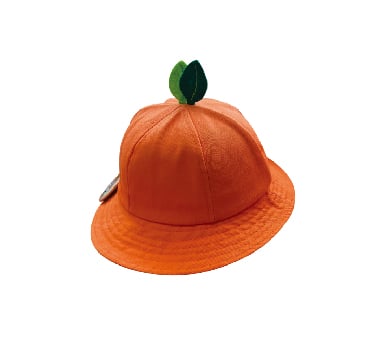 |
JEJU TANGERINE HAT
When you are in Jeju, you often run into people wearing orange hats. These hats come with a stem, perfectly recreating tangerines and making them the most Jeju of all merch. These hats are also quite affordable, so you can add a dash of excitement to your trip without breaking the bank. Add Tangerine Sunglasses to complete your tangerine setup.
|
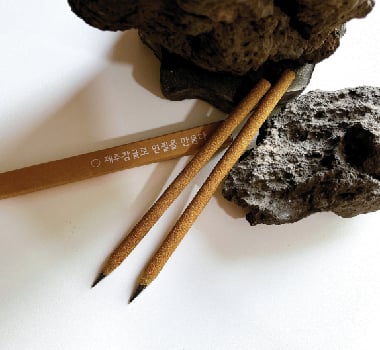 |
JEJU TANGERINE PENCIL
You can feel the creators’ care in trying to preserve the beautiful nature of Jeju with these pencils, for they are upcycled from materials generated during tangerine farming. To create this tangerine peelbased pencil, many years of research in the service of sustainability were needed. You can take this pencil as a memento of this beautiful island, but if you need to dispose of it, simply submerge it in water for three days and let it melt away.
|
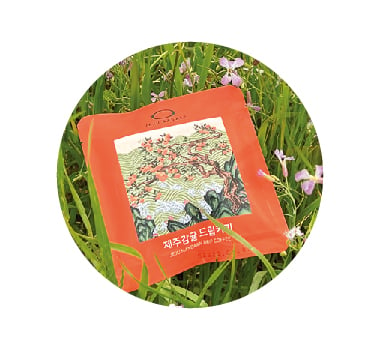 |
TANGERINE DRIP COFFEE
What an intriguing name. Tangerine drip coffee combines Brazilian and Guatemalan coffee beans with tangerines, and this creates a cup coffee front-ended by the deep flavors of the beans before being rounded out with the fragrance of tangerines.
|
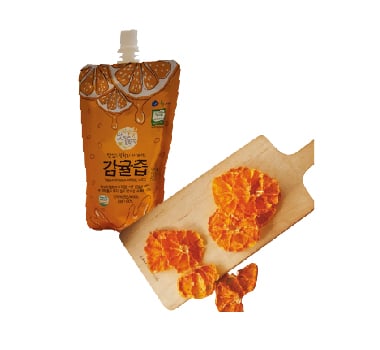 |
TANGERINE JUICE AND CHIPS
Tangerine juice or tangerine chips offer a more interesting way to enjoy the flavors of Jeju tangerine. Most of the tangerine juice and tangerine chips sold in souvenir shops around Jeju are made from tangerine grown without pesticides and processed in a healthy way without additives. The diversity of brands on offer made the choice a hard yet fun one.
|

Jeju black pork is known among Koreans as a musthave specialty in Jeju for its superlative quality and taste, differing significantly from pork grown in the mainland. There are plenty of restaurants serving grilled black pork in jeju, and there’s no shortage of appetizing products made with processed black pork as well.
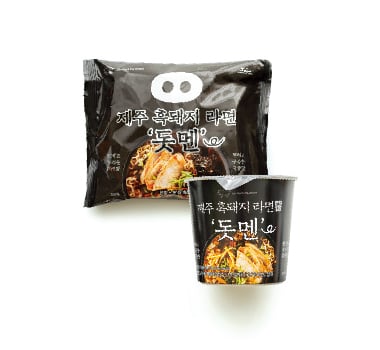 |
RAMYEON
Surprisingly, this ramyeon is made with black pork. The broth captures the deep flavors of black pork, in which plump and chewy noodles swim as vehicles of that flavor. Don’t forget to add some cold rice to the soup after finishing the ramyeon. Cold rice soaks up all the good stuff from the broth, and before long, you will be staring into the base of the bowl.
|
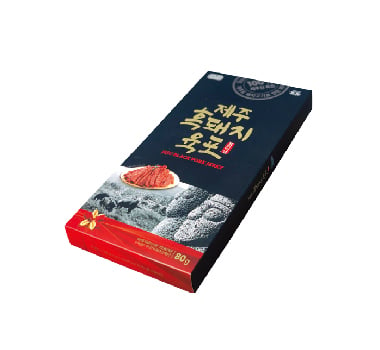 |
BLACK PORK JERKY
What could be a better snack for a traveler than a jerky? Black pork jerky is a worthy part of any gourmand trip in Jeju. It is sourced from Jeju black pigs grown with eco-friendly means, and the oak smoking process gives the jerky an excellent flavor and fragrance. What’s more, it is made according to traditional Korean methods, where the meat is first trimmed of fat, sliced thin, and spiced in soy sauce and other condiments.
|
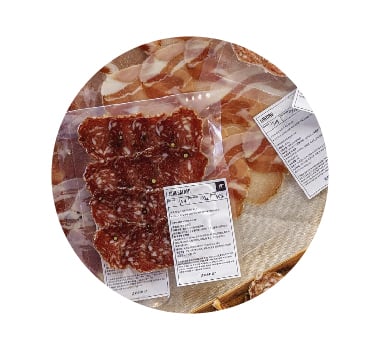 |
CHARCUTERIE
Now, this is a gourmet experience special to Jeju: Handmade Charcuterie, made by a chef trained in Europe using premium Jeju black pork, elevates the flavors of your trip in Jeju. The plate includes the full range of favorites such as salami, jambon, mortadella, prosciutto, and sausages, all the best ways to enjoy the flavors of Jeju black pork.
|

Hallabong is a tangerine cultivar that was introduced to Korea in the 1990s. Since then, it has enjoyed great popularity. The fruit has a thinner skin despite being larger in size, and its juicy flavor makes you keep coming back for more. A recent reinvention of this Jeju specialty into the yanggaeng (jelly) form has brought its popularity to greater heights.
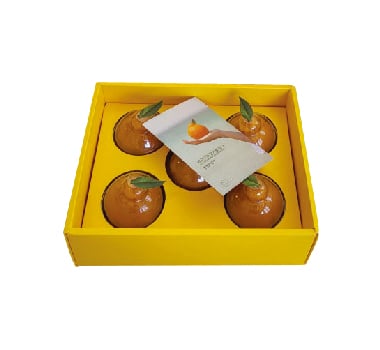 |
HALLABONG YANGGAENG SET
If a product is made with care, that care finds ways to shine through. Is it any wonder, then, that this jelly, made with Hallabong every early morning, is brimming with flavors? Its sweet and refreshing flavor instantly permeates your body the moment you bite into it.
|

Standing at 1,950m above sea level, Hallasan Mountain is the highest mountain in South Korea. It can be seen from anywhere in Jeju on a clear day. It is the origin of Jeju as a volcanic island and the place of life imbued with numerous legends. Hallasan Mountain is also an esteemed tourist destination, so many products like bread take after the mountain’s appearance.
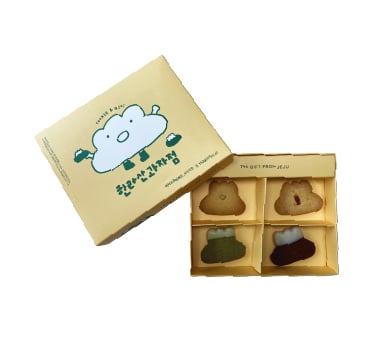 |
HALLASAN COOKIE
This cookie is made in the shape of the Hallasan Mountain, as seen from Seogwipo. It comes in four flavors, made with good ingredients like Udo Island’s peanuts, Hallabong, and Jeju matcha. Its resemblance to Hallasan Mountain makes it all the more delicious. The shop also offers merch designed in-house, such as marking tape, postcards, ballpoint pens, and stickers.
|
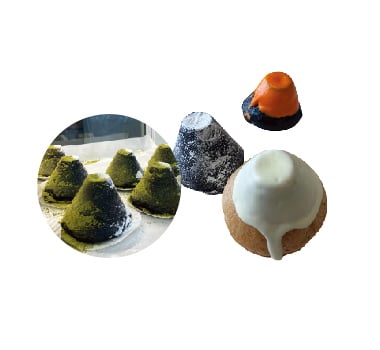 |
HALLASAN CREAM BUN
This bread looks like the Hallasan Mountain with a snow-capped peak. Its sumptuous appearance is positively inviting. There is quite a variety of flavors, from milk cream to vanilla, Udo Island’s peanuts, and organic matcha, so you have plenty of variety to choose from. Hallasan Cream Bun has established itself as one of the signature products of Seogwipo Maeil Olle Market, so head there if you want to take a bite of delicious Jeju-ness.
|

Haenyeo, women divers of Jeju, are one of the most recognizable symbols of Jeju. By working long hours in the treacherous waters, they have kept the barren island of Jeju afloat. You can learn more about this UNESCO Intangible Cultural Heritage in the Haenyeo Museum. Souvenirs related to Haenyeo can also be found there and other souvenir shops across Jeju.
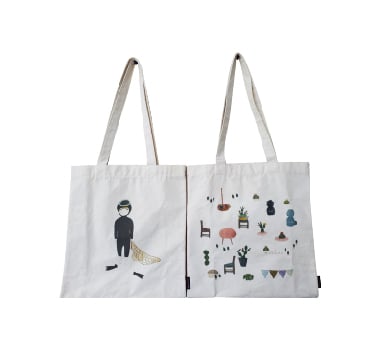 |
ECO BAG
Among the various Haenyeo merch sold in the Haenyeo Museum shop, the eco bag stands out. It captures the feeling of Jeju with its Haenyeo illustration. The bag is soft and smooth, which, coupled with the cute Haenyeo illustration, cheers you up right away as you shoulder the bag. These unique eco bags can be found across other souvenir shops as well.
|
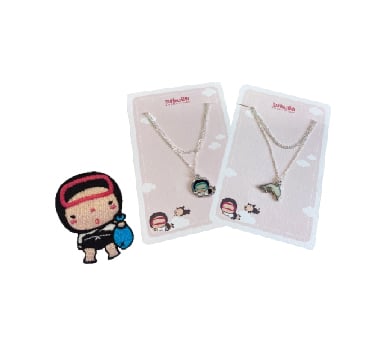 |
PENDANT, BRACELET, BROOCH
How can Haenyeo be so cute? “Sumbi Island,” a place known for its Haenyeo character offerings, is home to truly a staggering variety of Haenyeo products. Pendants, bracelets, and brooches, in particular, are popular for their cutesy Haenyeo character design. The design includes diving Haenyeo, Haenyeo holding a tewak, and even the dolphins of Jeju.
|
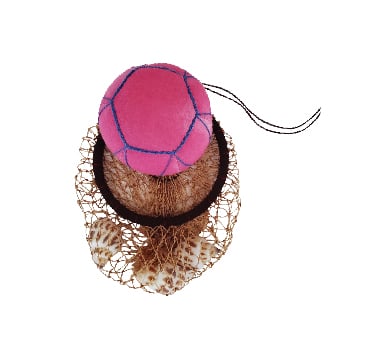 |
TEWAK HANDICRAFT
Tewak is a must-have tool for divers. When diving underwater, Haenyeo place this equipment on their chest so that their body can float upward. Because of its importance as a life-saving gear, tewak takes on a symbolic importance to Haenyeo, who are, in turn, symbols of Jeju. This tewak can now be found as ornaments, key rings, and other products. This allows one to carry that Jeju feeling anywhere, whether it be by hanging them in one’s room or keeping one in one’s keyring.
|

Jeju is famous for its tea. Many tea fields, including those with the highest level of eco-friendly cultivation in Korea and the largest in Korea in terms of land area, are located across the island. This is because the island provides the best conditions for growing tea plants. Indeed, Jeju tea is considered one of the best in the world, beloved for its deep and clear flavors and the variety of packaging available.
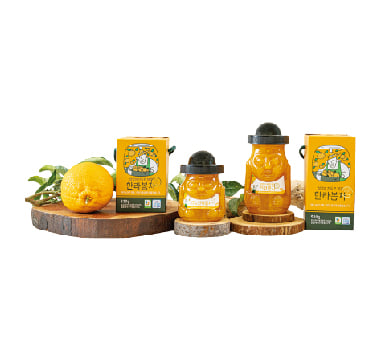 |
HALLABONG TEA
This product blends Hallabong fruits, which have been grown in Jeju’s pristine nature, with honey and other ingredients for both taste and health benefits. The flavor is sweet and tangy, while its rich vitamin content helps mitigate fatigue and prevent colds. The tea can be purchased as a liquid concentrate or in stick form.
|
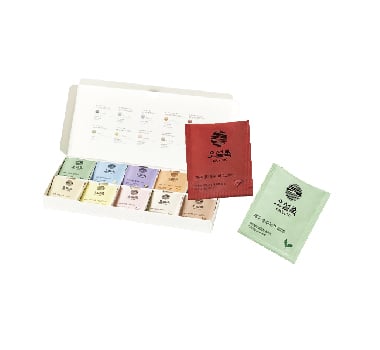 |
PREMIUM TEA COLLECTION
This collection contains 10 types of tea bags from the Osulloc Tea Museum, the most famous place for tea in Jeju. It contains all the favorites of Osulloc Tea Museum’s tea offerings, from green tea to camellia, canola and honey, Jeju volcanic oolong, and Earl Grey. The set comes in a luxurious packaging that is sure to satisfy everyone.
|
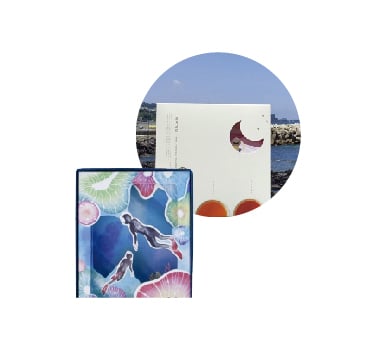 |
SOROK TEA SET
The word “sorok” is a Jeju word for deep and quiet. Just like its name, the Sorok Tea Set delivers deep flavors and a quiet sentimentality. These tea bags are packaged on the same day as they are roasted, and this ensures excellent freshness. The tea bags themselves come in individual packages for easy storage and transportation. The wrapping paper used for packaging is not only made with eco-friendly paper but also comes with a magnet attached to the back, allowing it to be used as interior decoration.
|

Jeju is home to multiple breweries that make use of Jeju specialties, such as Gosori Liquor and Omegi (Millet) Liquor. These unique breweries often run experience programs and sometimes have restaurants that serve food pairings, so you can make a pretty decent tour program across the island that is only made up of breweries.
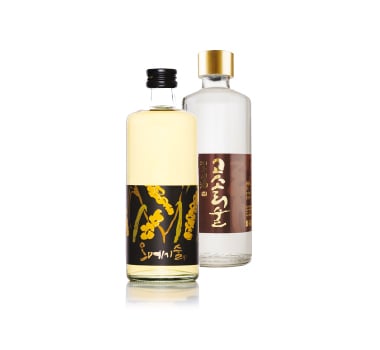 |
GOSORI AND OMEGI LIQUOR
Gosori Liquor is a distilled liquor made with millet grown in Jeju. This historic liquor is fruity, goes down smoothly, and gives way to deep flavors. Omegi Liquor, fermented from omegi (millet) rice cake, also impresses with its deep flavors.
|
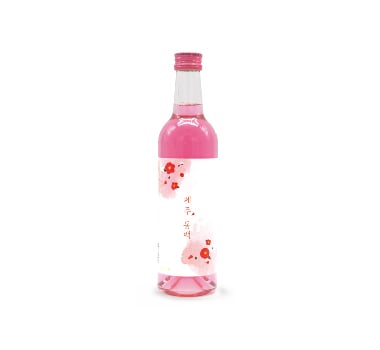 |
CAMELLIA LIQUOR
This liquor is fermented with red petals of camellia flowers in Jeju. It is fragrant with floral notes, tangy, and soft, with a beautiful, natural color.
|
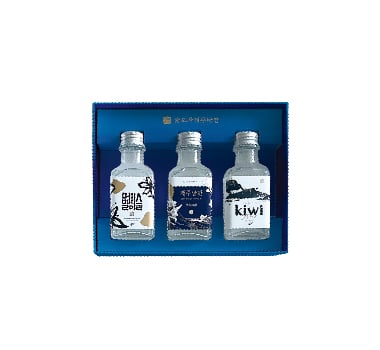 |
SOOLDOGA JEJU BADANG
Badang is a Jeju word used for the sea. The name of the liquor gives a good idea of what you can expect from this liquor, which has a refreshing, flavorful, and clear taste. The shop also offers miniature liquor bottles like Memil Iseul, brewed with Jeju buckwheat; Kiwisool, distilled from Jeju gold kiwi; and Jeju Nangman, made with Jeju white bellflower root.
|
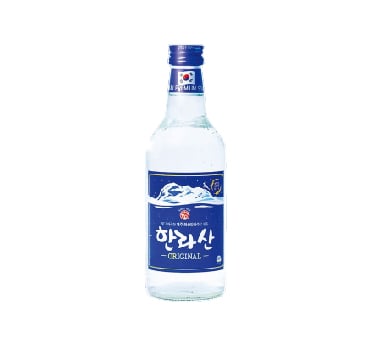 |
HALLASAN SOJU
Hallasan Soju is is made with Jeju volcanic mineral water. The lack of chemical treatment in the distillation process ensures a smooth feel and hangover-free finish, which makes it highly popular among the soju fandom.
|

Jeju has many products that are described as traditional, and one of the most famous among them has to be naturally dyed products. From lunar July to August, artisans harvest Jeju persimmon, juice them, and use the juice to dye fabrics. After multiple drying, the fabric takes on a beautiful yellow color. The fabric is then made into clothing, wallets, bags, pouches, and the like.
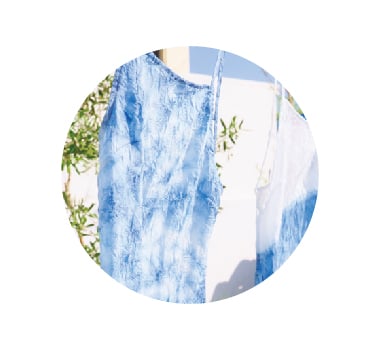 |
SHIRTS, TROUSERS, DRESSES
These products are made by the brand Scene of Jeju and Jeju farmers, using tangerines that cannot be sold on the market. Plus, they feel great against your body, using only natural fibers grown and produced without pesticides or chemical fertilizers. Their eco-friendly consciousness delivers the feeling of wearing Jeju’s pristine nature on one’s skin. The shop also offers classes.
|
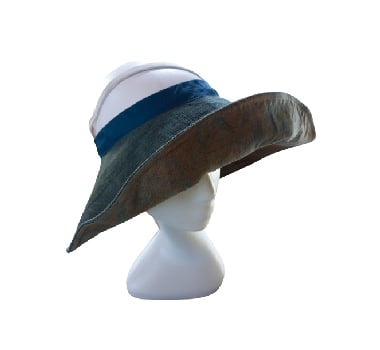 |
HAT AND SCARF
“Muldeuryeon Massim” grows and harvests tangerines and other ingredients to create naturally dyed products like hats and scarves.
|

Unlike anchovy-based broths served in the mainland, Jeju noodles come in flavorful pork broth. These noodles were once served for esteemed guests, and today, you have the chance to enjoy them through convenient meal kit products.
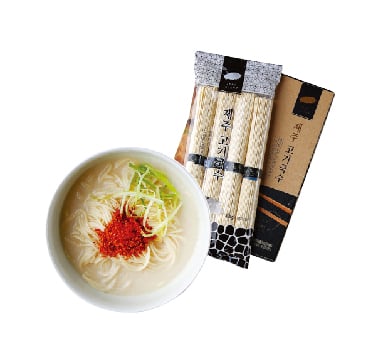 |
JEJU PORK NOODLES MEAL KIT
This meal kit delivers rich broth made with Jeju pork bones. You just need to boil the noodles and add the seasoning, so it is quite easy to whip up in a jiffy. Each package comes with two portions, so you can have a big feast or invite someone over.
|
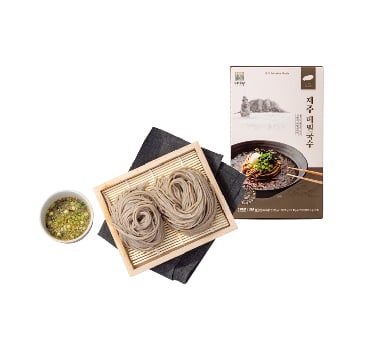 |
BUCKWHEAT NOODLES MEAL KIT
Jeju is the largest producer of buckwheat in Korea, so Jejustyle buckwheat noodles is a must-have dish in Jeju. This meal kit combines Jeju buckwheat and domestically produced wheat flour to impart a chewy texture to the noodles. The topping features grated Jeju radish for a refreshing kick.
|
Jeju is home to numerous quirky breweries. Here are some of the Jeju breweries that can present a satisfying wrap-up to your day.
Magpie Brewing Co. Brewery & Taproom Magpie is one of the leaders of the craft beer craze in Korea. The brewery offers an eclectic selection of seasonal beers centered around its flagship brews of pale ale, porter, Kölsch, and IPA. Magpie’s Taproom has a solid reputation as a beer and pizza joint.
- 23, Donghoecheon 1-gil, Jeju-si, Jeju-do
- +82-64-721-0227
Jerry’s Pub Opened in 2016 in Seogwidong, Seogwipo, Jerry’s Pub offers a selection of five craft brews themed after colors like black, white, and yellow. All craft beer served at Jerry’s delivers deep and complex flavors, so head there for a good time with good drinks.
- 209, Soldongsan-ro, Seogwipo-si, Jeju-do
- +82-507-1403-4696
Gobrew This is a combination of brewery, pub, and pension. From Cheonjiyeon’s orange fragrance to Daehakro, a perfect day-to-day brew; Woljeongri, inspired by the beach in Woljeong-ri; and Jeju Rock, a refreshing lager, Gobrew’s offerings are sure to be as memorable as its space.
- 171, Namseongjung-ro, Seogwipo-si, Jeju-do
- +82-507-1335-5747


Jeju is a very stony island. Because of its origins as a volcanic island, one can find numerous stone fields across the island. The people of Jeju have used these stones in their unique traditions, such as building batdam, which is a stone fence that demarcates field ownership. In particular, the iconic hole-ridden appearance of Jeju basalt has become a favored subject of souvenirs from the island.
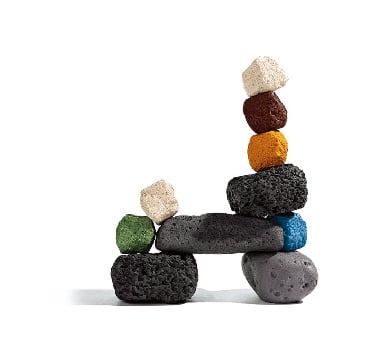 |
CRAYON
ODUJEJ, a company creating objet using materials unique to Jeju, came up with this crayon set inspired by Jeju’s stone mounds. Jeju stones’ texture and colors were brought to life using Jeju beeswax and natural mineral pigments.
|
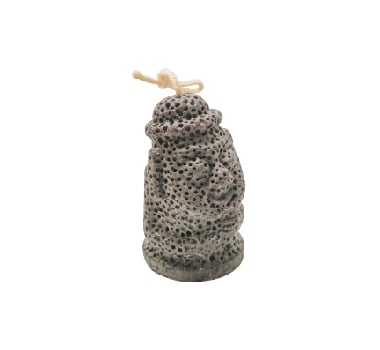 |
DOL HAREUBANG CANDLE
When lighting this candle, one feels as if they are back in Jeju. Dol Hareubang refers to stone sculptures erected outside government offices in Jeju in the old days. These stone sculptures stood as guardians of the island in the past, and now lend their appearances to souvenirs of Jeju. Dol Hareubang Candles can be found in souvenir shops, each bearing the touches of the local artists who made them.
|
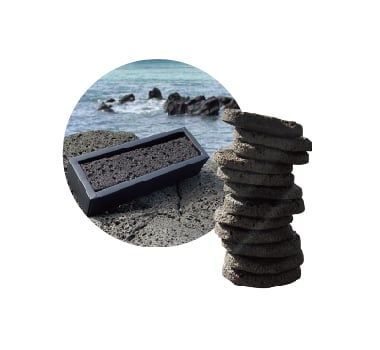 |
STONE-SHAPED BREAD
This bread takes after the rough surface of basalt in its appearance, but its use of green tea produced in the middle mountainous region, tangerines from Gotjawal, and Udo Island’s peanuts ensures that its fluffy flavor is as tasty as it looks. Plus, there’s a variety of options to choose from, from stone castella to stone brownie and stone dacquoise.
|

Not many places around the world can boast the same amount of benefits one reaps when one relies on nature in life. Jeju is blessed with an abundance of natural products, and the products made from them are equally diverse. Toothpaste, soap, and other household products that many are familiar with are available for travelers to choose from.
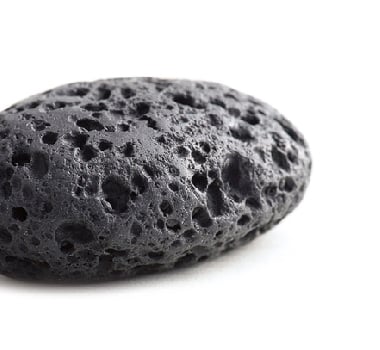 |
MONGDOL NATURAL SOAP
This cute soap is formulated by experts with charcoal, seaweed extract, and other ingredients that are excellent for removing oil from the skin, without the use of artificial additives such as surfactants, artificial flavors, colors, and preservatives.
|
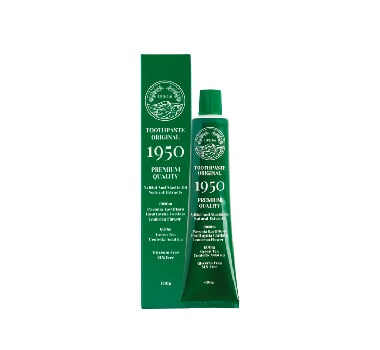 |
TOOTHPASTE
The smooth and refreshing feel of 1950 Toothpaste products were developed with Jeju's native herbs, Jeju volcanic seawater, Jeju organic lemon, and tangerine peel.
|





